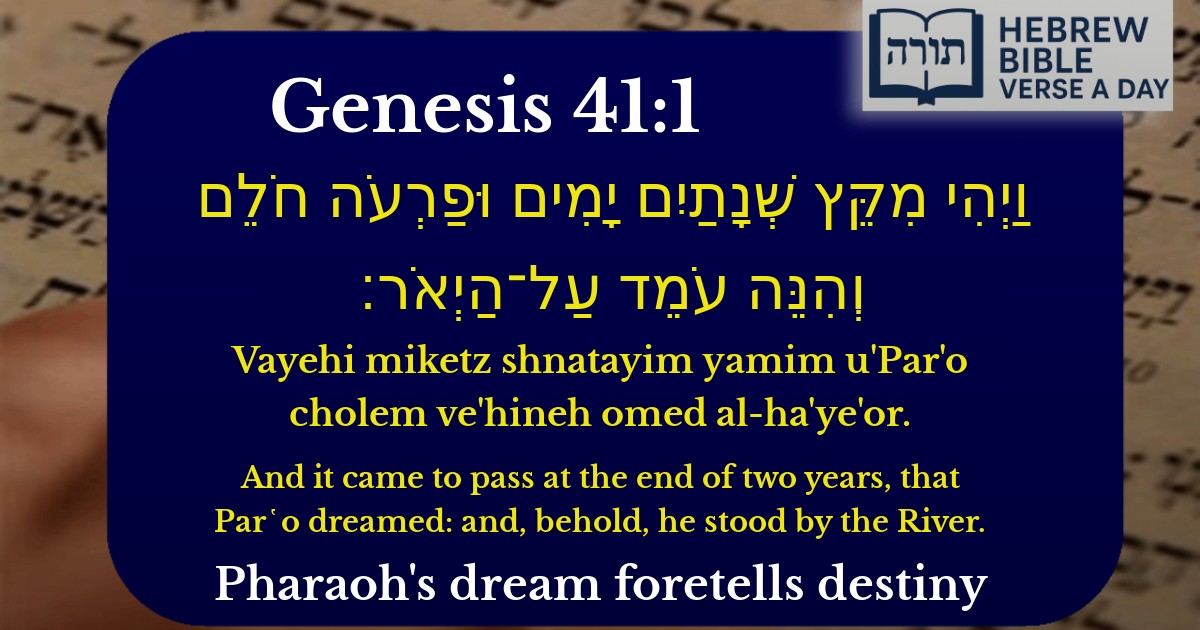Join Our Newsletter To Be Informed When New Videos Are Posted
Join the thousands of fellow Studends who rely on our videos to learn how to read the bible in Hebrew for free!
Hebrew Text
וַיְהִי מִקֵּץ שְׁנָתַיִם יָמִים וּפַרְעֹה חֹלֵם וְהִנֵּה עֹמֵד עַל־הַיְאֹר׃
English Translation
And it came to pass at the end of two years, that Par῾o dreamed: and, behold, he stood by the River.
Transliteration
Vayehi miketz shnatayim yamim u'Par'o cholem ve'hineh omed al-ha'ye'or.
Hebrew Leining Text
וַיְהִ֕י מִקֵּ֖ץ שְׁנָתַ֣יִם יָמִ֑ים וּפַרְעֹ֣ה חֹלֵ֔ם וְהִנֵּ֖ה עֹמֵ֥ד עַל־הַיְאֹֽר׃
וַיְהִ֕י מִקֵּ֖ץ שְׁנָתַ֣יִם יָמִ֑ים וּפַרְעֹ֣ה חֹלֵ֔ם וְהִנֵּ֖ה עֹמֵ֥ד עַל־הַיְאֹֽר׃
🎵 Listen to leining
Parasha Commentary
📚 Talmud Citations
This verse is quoted in the Talmud.
📖 Berakhot 55b
The verse is referenced in a discussion about dreams and their interpretations, particularly in the context of Pharaoh's dream as an example of significant dreams that require interpretation.


The Timing of Pharaoh's Dream
The verse states that Pharaoh's dream occurred "at the end of two years" (מִקֵּץ שְׁנָתַיִם יָמִים). Rashi explains that this refers to two full years after Yosef (Joseph) interpreted the dreams of Pharaoh's chief butler and baker while in prison (Bereishit 40:1-23). The butler had been restored to his position but forgot about Yosef until this moment. The Midrash (Bereishit Rabbah 89:2) emphasizes that Hashem orchestrated events so that Yosef would be remembered precisely when needed, demonstrating divine providence (hashgacha pratit).
Pharaoh's Dream by the River
The verse describes Pharaoh standing "by the River" (עַל־הַיְאֹר), referring to the Nile. The Ramban (Nachmanides) notes that the Nile was central to Egyptian life, as it provided water and fertility to the land. Pharaoh's dream occurring there signifies its importance to Egypt's sustenance. The Talmud (Chullin 92a) also suggests that rivers often symbolize divine judgment or revelation, indicating that Pharaoh's dream carried prophetic significance.
Symbolism of the Two Years
Pharaoh's Dream as a Turning Point
The dream marks a pivotal moment in Jewish history, leading to Yosef's ascent and the eventual descent of Yaakov's family to Egypt. The Sforno comments that Pharaoh's distress over the dream (וְהִנֵּה עֹמֵד—"behold, he stood") reflects his subconscious recognition of impending crisis, which only Yosef, through divine wisdom, could resolve. This sets the stage for the fulfillment of Hashem's promise to Avraham about exile and redemption (Bereishit 15:13-14).